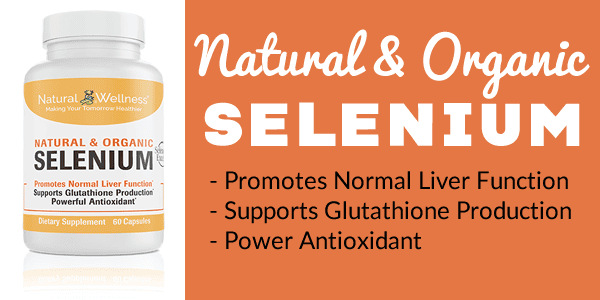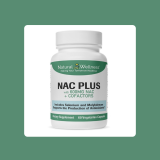

Selenium is a trace element we don’t typically hear much about. However, every cell in your body contains over a million atoms of it, totaling roughly 14 milligrams in all. (1)
If you’re not familiar with selenium, it’s helpful to understand why you need it and how to tell if your levels may be low. We also share a couple of actions you can take to ensure that you get enough of this important chemical element.
What Does Selenium Do for the Body?
Selenium is involved in several biological processes. One of its most important is the regulation of immune function. Specifically, selenium helps protect our immune system from oxidative stress while promoting cell survival and production. (2)
In fact, low selenium levels have been linked to many serious health conditions, including: (3)
- cardiovascular disease
- metabolic syndrome
- cancer
- obesity
- viral infections
Selenium and Your Thyroid
This element also plays a key role in thyroid gland function. What does selenium do for the thyroid? It supports the metabolism of this gland’s hormones while also being necessary for antioxidant function—which makes sense as the thyroid is the bodily organ that contains the most selenium per gram of tissue. (4)
Selenium, Fertility and Reproductive Function
Both males and females rely on selenium for optimal fertility and reproductive function. In males, selenium and selenoproteins are needed to produce sperm cells. (5) In females, selenium and selenium-containing proteins are important not only for getting pregnant but also in supporting a healthy pregnancy, along with promoting the growth and development of a healthy baby. (6)
Recommended Selenium Intake
The Office of Dietary Supplements recommends that most adults get 55 micrograms (mcg) of selenium daily. (7) Individuals who are pregnant or breastfeeding need more at 60 mcg and 70 mcg, respectively.
The tolerable upper intake level (UL) for adults is 400 mcg per day. (8) The UL is the maximum amount that can be consumed daily without negatively affecting one’s health. This is important to note because many research studies involve selenium intakes above the recommended amount but under the UL.
For example, in a study of overweight and obese individuals, some subjects were given 240 mcg of L-selenomethionine (a natural form of selenium) per day for three months, along with following a lower-calorie diet. (9) At the end of the trial, these individuals had greater reductions in their body fat mass and more lean muscle mass than those in the control.
Signs You May Have Low Selenium Levels
One way to know if your selenium levels are low is with a blood test. Your healthcare provider can order this test if you are concerned.
It can also be helpful to watch for certain symptoms. If you are severely deficient in selenium, you may experience: (8)
- nausea or vomiting
- fatigue
- headaches
- mental confusion
- seizures
- coma
Ways to Increase Selenium with Diet
Adding certain foods to your diet can help you get an adequate amount of selenium daily. What food is highest in selenium? Brazil nuts, seafood, and organ meats top the list. (7)

You can also boost your selenium intake by eating bread, cereals, other grains, dairy, poultry, and eggs.
Who Should Take Selenium Supplements?
Some people may benefit from taking a selenium supplement. For example, research indicates that thyroid disorders are common for athletes. This is due in part to strenuous exercise negatively affecting this gland, which can be exacerbated by a thyroid deficiency. (10)
Others at risk for a selenium deficiency and, therefore, could be helped by taking a supplement, include people: (8)
- with human immunodeficiency virus (HIV)
- undergoing dialysis due to kidney failure
- in low-selenium regions who follow a plant-based diet
Should you decide that supplementation is right for you, Natural Wellness offers a natural and organic selenium supplement. Each capsule provides 200 mcg of selenium from SelenoExcell, a high-selenium organic yeast. Like all other Natural Wellness products, this supplement is made in the U.S.A. in an FDA Registered Facility using Current Good Manufacturing Practices (cGMP).





